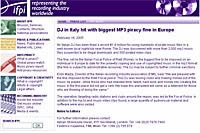 Saucy sensation seekers and sleazy surfers will be rewarded with their very own porn-friendly set of .xxx domains before the end of the year.
Saucy sensation seekers and sleazy surfers will be rewarded with their very own porn-friendly set of .xxx domains before the end of the year.
The Web’s virtual red-light district has been approved by ICANN, the non-profit organization responsible for Internet addresses.
ICANN has announced that it is working with the ICM Registry to finalise the new top-level domain details (other top-level domains awaiting a decision from ICANN are .asia, .mail, and .tel)
In an interview last year, Stuart Lawley, chairman of the ICM Registry, stated that .xxx domain names would cost around US$60 (~£32 ~€47.8) and have no restrictions on content, so long as sexually explicit material only featured adults.
“Apart from child pornography, which is completely illegal, we’re really not in the content-monitoring business,” he said.
 It is hoped that pornsters will voluntarily shift from their current .com addresses, thus making it easier for parents to filter out adult material, but in an industry not exactly renowned for its high moral stance, we anticipate that not all will be wiling to switch from their lucrative, high profile domains.
It is hoped that pornsters will voluntarily shift from their current .com addresses, thus making it easier for parents to filter out adult material, but in an industry not exactly renowned for its high moral stance, we anticipate that not all will be wiling to switch from their lucrative, high profile domains.
Moreover, with the $60 price tag being around ten times higher than the cost of many dot-com names, we suspect that many porno kings will stick with the cheapest option. The wannabe-Bonking Baron’s that don’t currently have established sites with prize domain names are bound to pile into the .xxx domains – either to use them or with the hope of selling them on.
It’s common knowledge that the ‘right’ porn domain can bring a near guaranteed financial fortune. The long disputed sex.com domain is widely thought to have brought in up to $1m/month, simply from banner ads.
The ICM Registry plans to handle the technical aspects of running the master database of .xxx sex sites, with the non-profit International Foundation For Online Responsibility (IFFOR) charged with setting the rules for the .xxx domain.
The IFFOR will have a seven-person board of directors, featuring a selection of bizarre job titles such as “child advocacy advocate” and “free-expression aficionado” along with some big-hatted, cheroot smoking, pink Chevvy-driving dude from the adult entertainment industry.
 Unlike the milk-snatcher Margaret Thatcher, the ICANN’s decision proves that they are definitely for turning – in November 2000, the ICANN staff rejected ICM Registry’s first application after objecting to domains such as .kids and .xxx.
Unlike the milk-snatcher Margaret Thatcher, the ICANN’s decision proves that they are definitely for turning – in November 2000, the ICANN staff rejected ICM Registry’s first application after objecting to domains such as .kids and .xxx.
An outrage of politicians were quick to deride the decision with the Republican Fred Upton demanding to know why ICANN didn’t approve the .xxx domain “as a means of protecting our kids from the awful, awful filth, which is sometimes widespread on the Internet”.
With a little less hand-wringing, Sen Joseph Lieberman complained to a federal commission that the domain would be an essential means to force adult Webmasters to “abide by the same standard as the proprietor of an X-rated movie theatre”.
The American Civil Liberties Union has expressed its concerns about .xxx domains, suggesting that some uptight nations may force sites dealing with sensitive topics such as gay rights, homosexuality or birth control into the easily blocked .xxx zone.
ICM Registry – Sponsored Voluntary Adult TLD Application
Internet Corporation for Assigned Names and Numbers (ICANN)
International Foundation for Online Responsibility
 A “well known” Italian DJ could be hit with a record-breaking fine of up to 1.4 million euros ($1.8 million, £968,000) for using thousands of pirate music files in a nightclub near Rome, police said on Wednesday.
A “well known” Italian DJ could be hit with a record-breaking fine of up to 1.4 million euros ($1.8 million, £968,000) for using thousands of pirate music files in a nightclub near Rome, police said on Wednesday. If they weren’t already unpopular enough with a large part of the online music file sharers, the Recording Industry Association of America (RIAA) has managed to score a spectacular PR own goal by suing a dead woman for swapping music files.
If they weren’t already unpopular enough with a large part of the online music file sharers, the Recording Industry Association of America (RIAA) has managed to score a spectacular PR own goal by suing a dead woman for swapping music files. The Wall Street Journal is reporting that US Federal Communications Commission (FCC) Chairman, Michael Powell, will be leaving his position today.
The Wall Street Journal is reporting that US Federal Communications Commission (FCC) Chairman, Michael Powell, will be leaving his position today.